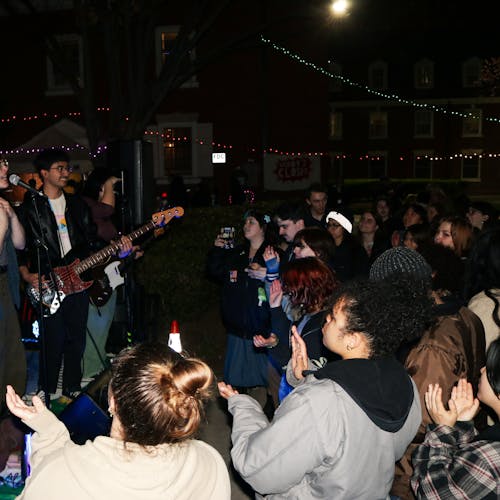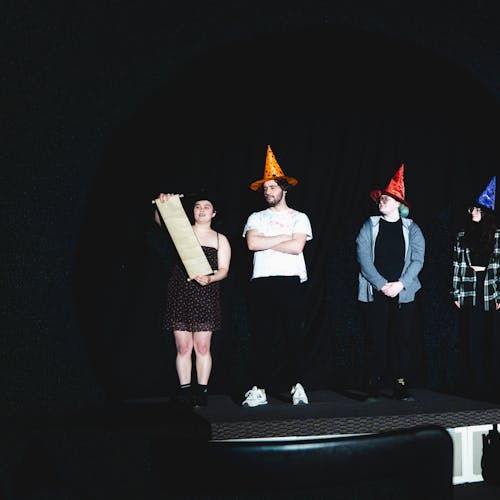Cabaret Theatre's 'Plano' takes audiences on wild ride through Texas

On March 7, Cabaret Theatre hosted a one-night-only performance of Will Arbery's "Plano."
The striking play follows three sisters: the devout Isabel (School of Arts and Sciences first-year Aria Clarke), the sculptor Genevieve (School of Arts and Sciences senior Felicity Winter) and the intelligent Anne (School of Arts and Sciences sophomore Ekaterina Min). Together, the sisters navigate curses, family dramas and hauntings.
In an interview with The Daily Targum, Winter spoke about how Plano differs from Cabaret Theatre's other productions.
"This play deals with the supernatural and the absurd in a way that doesn't often come up in other plays Cabaret has done," said Winter. "'Plano' plays with time and reality in a way that I found interesting and challenging as an actor."
The show opens on Genevieve's front porch in Dallas, Texas, where Anne announces her pregnancy and later, her marriage to a man named John, played by Mason Gross School of the Arts sophomore Ashton Jenkins. Isabel also has an announcement of her own — she plans to move to Chicago and volunteer for a Catholic nonprofit.
Genevieve adopts a much more pessimistic perspective, expressing disapproval for her sisters' choices. Genevieve's husband Steve, played by School of Arts and Sciences senior John Baker — who also directed the play — shows skepticism regarding Anne's fiancé and his ulterior motives for agreeing to marry her.
This first scene sets the tone for the rest of the show — the three sisters, who all shine through their passionate dialogue, are hindered by their male counterparts.
As the play progresses, Steve leaves Genevieve for another woman but later calls for help, revealing he's stuck in Plano, which becomes a purgatory for the characters.
During this phone call, another "Steve" comes onto the front porch — Genevieve's husband has inexplicably split into two, and she's unable to rid herself of the one in her home. The sisters attempt to get rid of him, but a third "Steve" then appears in the garage.
As the play unfolds, initially appearing straightforward, the introduction of the "Steves" propels "Plano" into an exploration of existential themes, causing cast and audience members alike to devise their own interpretations.
"I think the multiple Steves are a manifestation of Genevieve's inability to move on. Steve has left, but he's still very much in her thoughts, so he isn't really gone … Plano … becomes this mythical place men run away to," Winter said. "I think that could be one interpretation of the symbolism of Plano, but I like to think Plano is symbolic of transformation, good or bad."
Anne has her own share of relationship difficulties — her husband John is distant, always heading to "Plano," where he dances in cowboy attire to a "Jolene" remix. Her increasingly desperate attempts to speak to her husband are always rebuffed or met with little interest. She considers moving, but she is trapped with a slug infestation in her home — what if the slugs follow her?
Meanwhile, in Chicago, Isabel meets a boy who she claims loves her, but then marries her best friend. When she returns home, she is haunted by a Faceless Ghost, played by School of Arts and Sciences first-year Paige Palent. The silent, looming figure watches over Isabel while she sleeps and dances with the other characters.
Time passes for the sisters, yet they are followed by the same troubles and the persistent presence of the men in their lives. The cast did an excellent job of creating a warped and humorously dark atmosphere, exploring slugs and ghosts while maintaining relatability.
The set, which was designed by School of Engineering first-year Olanrewaju Falae, made full use of its talented cast. The front porch served as the center of conversation and action, while a table to the right represented Anne's home.
In between scenes, the lights were turned off as the actors reappeared or left the stage — red lighting, dimmed spotlights and soundtracks enhanced the surrealism of the play.
Anyone who missed out on "Plano" will have the chance to catch Cabaret's final production of the season "Company," from April 12 to April 14.



